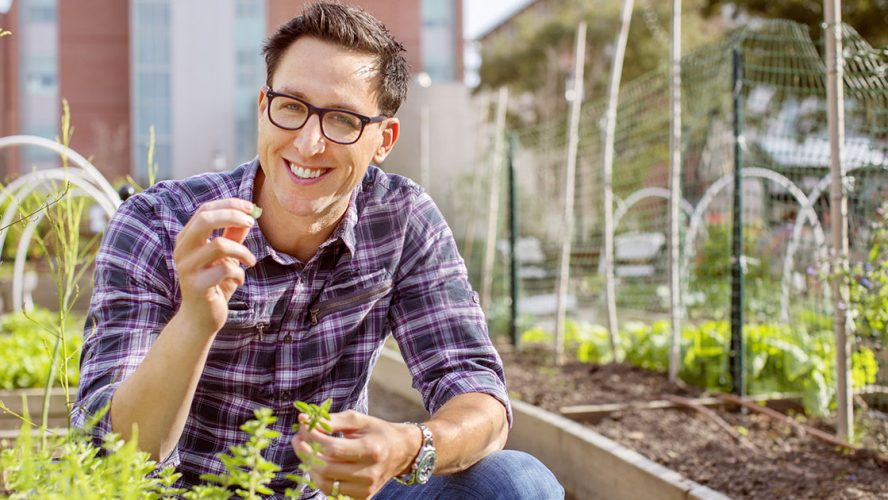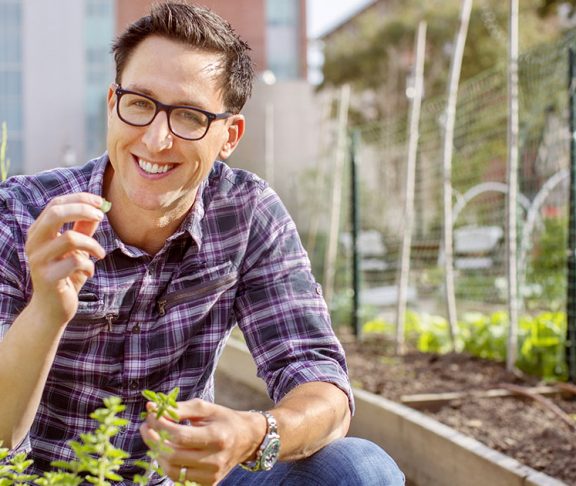Doctors and gastroenterologists have said that one of the best ways to improve your overall health is to optimize your gut microbiome. There are plenty of theories and specialized diets, like keto, paleo, or gluten-free, that claim to do just that. But Dr. Will Bulsiewicz, a celebrated gastroenterologist and author of the upcoming book “Fiber Fueled,” says the real secret is a lot simpler than a strict diet plan.
“The most important thing in terms of building a healthy gut is actually, rather than emphasizing or overemphasizing specific plants, to get as much variety, as much diversity, as humanly possible when it comes to the plants,” he explains. “And the reason why is because every single plant contains fiber that will feed the microbiome, but they will feed different populations of bacteria. So if we want to support as diverse a microbiome as possible, then what we really need is a diverse diet.”
Creating a diverse diet
This can come as a surprise, especially with regards to certain foods broadly considered “unhealthy” or, at least, not optimal for maintaining good gut health. Bulsiewicz mentions potatoes, for example, which are seen as bad because of how high in starch they are. But this isn’t always the case.
“White potatoes you know, we go back and forth on them, and many people I feel like in recent years, effectively say anything that’s white must be bad,” Bulsiewicz says, which is true for sugar, perhaps, but this kind of blanket statement isn’t necessarily accurate all the time. “But potatoes actually contain resistant starch and resistant starch is wonderful for the gut microbiome.”
He also says there’s a neat way to get the most benefit out of resistant starch in potatoes. “There’s actually this kind of fun, cool hack that you can do, where if you take your mashed potatoes and you warm them up and then cool them, and you do that repeatedly, you will keep cranking out more and more and more resistant starch. And so you can actually increase the nutritional value of your potato by eating it and cooling it repeatedly.”
Dispelling food myths
Another thing that Bulsiewicz says is commonly misunderstood is gluten. The real problem, he says, isn’t the gluten itself, it’s that most gluten-containing foods are so often highly processed. Of course highly processed foods containing gluten can be harmful, but so can any food that’s highly processed.
“I think that we are throwing the baby out with the bathwater. There are studies that show that people who go gluten free when they don’t need to increase their risk of heart disease, which is the No. 1 killer in the United States. And the reason why is because they are eliminating the number one source of whole grains in the American diet which is wheat,” Bulsiewicz explains. “So, the answer to the question is that there is not strong evidence gluten actually damages the gut when people eat real food.”
Ezekiel bread and sourdough, Bulsiewicz says, are “fair game” in a healthy diet. If you do feel compelled to go gluten-free, make an effort to include an increased amount of gluten-free whole grains like oats or quinoa.
The trouble with specialized diets
Diets like paleo or keto, Bulsiewicz says, are “not ideal,” and there are no studies that say people live longer by eating this way.
The theory behind the paleo diet, which is that humans should return to the way our paleolithic ancestors ate, Bulsiewicz says, isn’t based on any science he would hang his hat on. The so-called “ancestral diet,” he says, doesn’t really exist, since our ancestors’ diets depended on what was available wherever they happened to have lived.
The keto diet, based on the idea of maintaining metabolic “ketosis,” has been shown to have positive health benefits in the short term, but Bulsiewicz explains can have adverse health effects in the long term.
“There are some people who are true believers in the keto diet, and there are some studies that show benefit, but the key is that when they show benefit the benefit is always short term.” He also points out that the benefits of this diet are always compared to the standard American diet which he says is “the worst diet on the planet.” So any diet compared to this way of eating “is going to look like a knight in shining armor.”
“I am concerned eating a ketogenic diet, which is extremely restrictive and limits your ability to eat many, many healthy whole plant foods, is going to have long term negative effects on your gut.”
He explains that a diet so high in animal fats can be harmful to heart health later in life. But this isn’t the only risk of a highly restrictive diet. “I’m concerned about the restrictive nature which can trigger eating disorders,” he says, which he believes is not discussed enough.
“The big picture is being missed, which is that when you eat a diet that is like 70 percent animal fats, you are setting yourself up for heart disease and cancer.”
Think plant-based
Bulsiewicz says that instead of thinking about foods to eliminate from your diet, the healthiest way forward is to think about foods you’re adding to your diet. The average American diet is heavily based around meat protein, and Bulsiewicz says the key is to reorient our diets around plants instead.
Bulsiewicz, who is vegan himself, points out that cultures and populations around the world whose diets rely mostly on plant foods rather than animal products are often the healthiest. Such places include Mediterranean regions or parts of Asia including Thailand and Vietnam.
“If you look at the healthiest populations on the planet in modern times, they’re in the five blue zones, and all five blue zones are 90 percent plant based. So, they are not necessarily vegan, but they are plant-predominant in a way where the meat is not the centerpiece. The plant is the centerpiece. The meat is the side show.”
He doesn’t expect the average person in the United States, whose diet is 60 percent processed food, 30 percent meat, dairy, and eggs, and 10 percent actual fruits, vegetables, whole grains, and other plants, to suddenly go vegan overnight.
“My goal is to go from 10 [percent plant-based] to 30, and from 30 to 50. And I think that as they make this transition and walk down this path where they’re becoming increasingly more plant- based, they’re going to feel so much better. They’re going to want more, even if they did not eliminate meat at all.”

